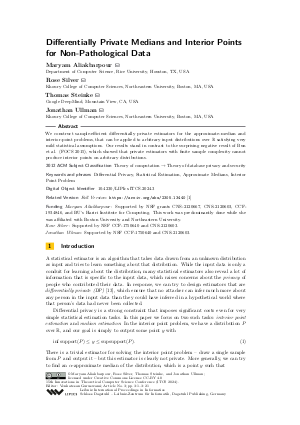Differentially Private Medians and Interior Points for Non-Pathological Data
Authors Maryam Aliakbarpour, Rose Silver, Thomas Steinke, Jonathan Ullman
-
Part of:
Volume:
15th Innovations in Theoretical Computer Science Conference (ITCS 2024)
Part of: Series: Leibniz International Proceedings in Informatics (LIPIcs)
Part of: Conference: Innovations in Theoretical Computer Science Conference (ITCS) - License:
 Creative Commons Attribution 4.0 International license
Creative Commons Attribution 4.0 International license
- Publication Date: 2024-01-24
File

PDF
LIPIcs.ITCS.2024.3.pdf
- Filesize: 0.82 MB
- 21 pages
Document Identifiers
Related Versions
- Full Version https://arxiv.org/abs/2305.13440
Subject Classification
ACM Subject Classification
- Theory of computation → Theory of database privacy and security
Keywords
- Differential Privacy
- Statistical Estimation
- Approximate Medians
- Interior Point Problem
Metrics
- Access Statistics
-
Total Accesses (updated on a weekly basis)
0PDF Downloads0Metadata Views
Abstract
We construct sample-efficient differentially private estimators for the approximate-median and interior-point problems, that can be applied to arbitrary input distributions over ℝ satisfying very mild statistical assumptions. Our results stand in contrast to the surprising negative result of Bun et al. (FOCS 2015), which showed that private estimators with finite sample complexity cannot produce interior points on arbitrary distributions.
Cite As Get BibTex
Maryam Aliakbarpour, Rose Silver, Thomas Steinke, and Jonathan Ullman. Differentially Private Medians and Interior Points for Non-Pathological Data. In 15th Innovations in Theoretical Computer Science Conference (ITCS 2024). Leibniz International Proceedings in Informatics (LIPIcs), Volume 287, pp. 3:1-3:21, Schloss Dagstuhl – Leibniz-Zentrum für Informatik (2024)
https://doi.org/10.4230/LIPIcs.ITCS.2024.3
BibTex
@InProceedings{aliakbarpour_et_al:LIPIcs.ITCS.2024.3,
author = {Aliakbarpour, Maryam and Silver, Rose and Steinke, Thomas and Ullman, Jonathan},
title = {{Differentially Private Medians and Interior Points for Non-Pathological Data}},
booktitle = {15th Innovations in Theoretical Computer Science Conference (ITCS 2024)},
pages = {3:1--3:21},
series = {Leibniz International Proceedings in Informatics (LIPIcs)},
ISBN = {978-3-95977-309-6},
ISSN = {1868-8969},
year = {2024},
volume = {287},
editor = {Guruswami, Venkatesan},
publisher = {Schloss Dagstuhl -- Leibniz-Zentrum f{\"u}r Informatik},
address = {Dagstuhl, Germany},
URL = {https://drops.dagstuhl.de/entities/document/10.4230/LIPIcs.ITCS.2024.3},
URN = {urn:nbn:de:0030-drops-195313},
doi = {10.4230/LIPIcs.ITCS.2024.3},
annote = {Keywords: Differential Privacy, Statistical Estimation, Approximate Medians, Interior Point Problem}
}
Author Details
Funding
- Aliakbarpour, Maryam: Supported by NSF grants CNS-2120667, CNS-2120603, CCF-1934846, and BU’s Hariri Institute for Computing. This work was predominantly done while she was affiliated with Boston University and Northeastern University.
- Silver, Rose: Supported by NSF CCF-1750640 and CNS-2120603.
- Ullman, Jonathan: Supported by NSF CCF-1750640 and CNS-2120603.
References
- Maryam Aliakbarpour, Rose Silver, Thomas Steinke, and Jonathan Ullman. Differentially private medians and interior points for non-pathological data. arXiv preprint, 2023. URL: https://arxiv.org/abs/2305.13440.
- Noga Alon, Roi Livni, Maryanthe Malliaris, and Shay Moran. Private pac learning implies finite littlestone dimension. In Proceedings of the 51st Annual ACM SIGACT Symposium on Theory of Computing, pages 852-860, 2019. URL: https://arxiv.org/abs/1806.00949.
- Hilal Asi and John C Duchi. Near instance-optimality in differential privacy. arXiv preprint, 2020. URL: https://arxiv.org/abs/2005.10630.
-
Amos Beimel, Shay Moran, Kobbi Nissim, and Uri Stemmer. Private center points and learning of halfspaces. In Conference on Learning Theory, pages 269-282. PMLR, 2019.

-
Amos Beimel, Kobbi Nissim, and Uri Stemmer. Private learning and sanitization: Pure vs. approximate differential privacy. In Approximation, Randomization, and Combinatorial Optimization. Algorithms and Techniques, RANDOM-APPROX '13, pages 363-378. Springer, 2013.

- Daniel Berend and Aryeh Kontorovich. A sharp estimate of the binomial mean absolute deviation with applications. Statistics & Probability Letters, 83(4):1254-1259, 2013. URL: https://doi.org/10.1016/j.spl.2013.01.023.
- Victor-Emmanuel Brunel and Marco Avella-Medina. Propose, test, release: Differentially private estimation with high probability. arXiv preprint, 2020. URL: https://arxiv.org/abs/2002.08774.
-
Mark Bun, Cynthia Dwork, Guy N Rothblum, and Thomas Steinke. Composable and versatile privacy via truncated cdp. In Proceedings of the 50th Annual ACM SIGACT Symposium on Theory of Computing, pages 74-86, 2018.

-
Mark Bun, Kobbi Nissim, Uri Stemmer, and Salil Vadhan. Differentially private release and learning of threshold functions. In IEEE 56th Annual Symposium on Foundations of Computer Science (FOCS), pages 634-649, 2015.

-
Edith Cohen, Xin Lyu, Jelani Nelson, Tamás Sarlós, and Uri Stemmer. Optimal differentially private learning of thresholds and quasi-concave optimization. In Proceedings of the 55th Annual ACM Symposium on Theory of Computing, pages 472-482, 2023.

- Edwin L. Crow. The mean deviation of the poisson distribution. Biometrika, 45(3/4):556-559, 1958. URL: http://www.jstor.org/stable/2333201.
-
Cynthia Dwork and Jing Lei. Differential privacy and robust statistics. In Proceedings of the 41st ACM Symposium on Theory of Computing, STOC '09, pages 371-380. ACM, 2009.

-
Cynthia Dwork, Frank McSherry, Kobbi Nissim, and Adam Smith. Calibrating noise to sensitivity in private data analysis. In Conference on Theory of Cryptography, TCC '06, pages 265-284, New York, NY, USA, 2006.

-
Nika Haghtalab, Tim Roughgarden, and Abhishek Shetty. Smoothed analysis of online and differentially private learning. Advances in Neural Information Processing Systems, 33:9203-9215, 2020.

-
Haim Kaplan, Katrina Ligett, Yishay Mansour, Moni Naor, and Uri Stemmer. Privately learning thresholds: Closing the exponential gap. In Conference on Learning Theory, pages 2263-2285. PMLR, 2020.

- Vishesh Karwa and Salil Vadhan. Finite sample differentially private confidence intervals. In 9th Innovations in Theoretical Computer Science Conference (ITCS 2018). Schloss Dagstuhl-Leibniz - Zentrum für Informatik, 2018. URL: https://arxiv.org/abs/1711.03908.
- Adam Smith and Jonathan Ullman. Privacy in statistics and machine learning spring 2021 lecture 9: Approximate differential privacy. URL: https://dpcourse.github.io/2021-spring/index.html.
-
Christos Tzamos, Emmanouil-Vasileios Vlatakis-Gkaragkounis, and Ilias Zadik. Optimal private median estimation under minimal distributional assumptions. Advances in Neural Information Processing Systems, 33:3301-3311, 2020.

- Salil Vadhan. The complexity of differential privacy, 2016. URL: https://privacytools.seas.harvard.edu/files/privacytools/files/complexityprivacy_1.pdf.
